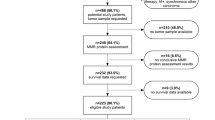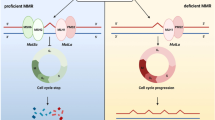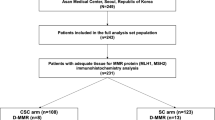Abstract
Background
We examined the impact of mismatch repair (MMR) status on efficacy of first-line fluoropyrimidine plus platinum (FP) chemotherapy in patients with HER2-negative metastatic, recurrent, or unresectable gastric cancer (mGC).
Methods
Patients with mGC receiving first-line FP between 2015 and 2018 at Asan Medical Center, Korea, were reviewed. We evaluated the clinical characteristics and the efficacy of chemotherapy according to MMR status in patients with available immunohistochemistry results.
Results
Of 895 patients, we analyzed 543 with available MMR protein expression results, and deficient MMR (dMMR) was detected in 4.4% (n = 24). Patients with dMMR exhibited a significantly higher median age than those with proficient MMR (pMMR) (64 vs. 58 years, p = 0.044). No signet ring cell carcinoma (SRCC) was detected among dMMR tumors, whereas SRCC was found in 17.5% of pMMR. Objective response rate was 27.3% in dMMR and 34.3% in pMMR (p = 0.556). No difference in progression-free survival was noted between patients with dMMR and pMMR (median, 5.6 vs. 5.8 months, p = 0.266). Patients with dMMR tended to have better overall survival than those with pMMR although this difference was not statistically significant (median, 17.9 vs. 12.2 months, p = 0.183).
Conclusions
Efficacy of first-line FP was not different by MMR status in mGC patients.


Similar content being viewed by others
Data availability
The datasets generated during and/or analyzed during the current study are available from the corresponding author on reasonable request.
References
Sung H, Ferlay J, Siegel RL, Laversanne M, Soerjomataram I, Jemal A, et al. Global cancer statistics 2020: GLOBOCAN estimates of incidence and mortality worldwide for 36 cancers in 185 countries. CA Cancer J Clin. 2021;71(3):209–49.
Germano G, Amirouchene-Angelozzi N, Rospo G, Bardelli A. The clinical impact of the genomic landscape of mismatch repair-deficient cancers. Cancer Discov. 2018;8(12):1518–28.
Le DT, Uram JN, Wang H, Bartlett BR, Kemberling H, Eyring AD, et al. PD-1 blockade in tumors with mismatch-repair deficiency. N Engl J Med. 2015;372(26):2509–20.
Pietrantonio F, Miceli R, Raimondi A, Kim YW, Kang WK, Langley RE, et al. Individual patient data meta-analysis of the value of microsatellite instability as a biomarker in gastric cancer. J Clin Oncol. 2019;37(35):3392–400.
Smyth EC, Wotherspoon A, Peckitt C, Gonzalez D, Hulkki-Wilson S, Eltahir Z, et al. Mismatch repair deficiency, microsatellite instability, and survival: an exploratory analysis of the medical research council adjuvant gastric infusional chemotherapy (MAGIC) trial. JAMA Oncol. 2017;3(9):1197–203.
Choi YY, Kim H, Shin SJ, Kim HY, Lee J, Yang HK, et al. Microsatellite instability and programmed cell death-ligand 1 expression in stage ii/iii gastric cancer: post hoc analysis of the classic randomized controlled study. Ann Surg. 2019;270(2):309–16.
Network NCC. Gastric Cancer (Verseion 1. 2023) [Available from: https://www.nccn.org/professionals/physician_gls/pdf/gastric.pdf. Accessed 21 Mar 2023.
Lordick F, Carneiro F, Cascinu S, Fleitas T, Haustermans K, Piessen G, et al. Gastric cancer: ESMO clinical practice guideline for diagnosis, treatment and follow-up. Ann Oncol. 2022;33(10):1005–20.
Kang YK, Yook JH, Park YK, Lee JS, Kim YW, Kim JY, et al. PRODIGY: a phase iii study of neoadjuvant docetaxel, oxaliplatin, and s-1 plus surgery and adjuvant s-1 versus surgery and adjuvant s-1 for resectable advanced gastric cancer. J Clin Oncol. 2021;39(26):2903–13.
Hyung J, Cho H, Kim HD, Park YS, Moon M, Ryu MH, et al. DNA mismatch repair deficiency and outcomes of patients with locally advanced gastric cancer treated with preoperative docetaxel, oxaliplatin, and S-1 plus surgery and postoperative S-1 or surgery plus postoperative S-1: a sub-analysis of the phase 3 PRODIGY trial. Gastric Cancer. 2024;27(1):110–7.
Janjigian YY, Shitara K, Moehler M, Garrido M, Salman P, Shen L, et al. First-line nivolumab plus chemotherapy versus chemotherapy alone for advanced gastric, gastro-oesophageal junction, and oesophageal adenocarcinoma (CheckMate 649): a randomised, open-label, phase 3 trial. Lancet. 2021;398(10294):27–40.
Rha SY, Oh DY, Yañez P, Bai Y, Ryu MH, Lee J, et al. Pembrolizumab plus chemotherapy versus placebo plus chemotherapy for HER2-negative advanced gastric cancer (KEYNOTE-859): a multicentre, randomised, double-blind, phase 3 trial. Lancet Oncol. 2023;24(11):1181–95.
Lee CT, Chow NH, Chen YL, Ho CL, Yeh YM, Lin SC, et al. Clinicopathological features of mismatch repair protein expression patterns in colorectal cancer. Pathol Res Pract. 2021;217: 153288.
Pasanen A, Loukovaara M, Bützow R. Clinicopathological significance of deficient DNA mismatch repair and MLH1 promoter methylation in endometrioid endometrial carcinoma. Mod Pathol. 2020;33(7):1443–52.
Abrha A, Shukla ND, Hodan R, Longacre T, Raghavan S, Pritchard CC, et al. Universal screening of gastrointestinal malignancies for mismatch repair deficiency at stanford. JNCI Cancer Spectrum. 2020;4(5):pkaa054.
Eisenhauer EA, Therasse P, Bogaerts J, Schwartz LH, Sargent D, Ford R, et al. New response evaluation criteria in solid tumours: revised RECIST guideline (version 1.1). Eur J Cancer. 2009;45(2):228–47.
Koo DH, Ryoo BY, Kim HJ, Ryu MH, Lee SS, Moon JH, et al. A prognostic model in patients who receive chemotherapy for metastatic or recurrent gastric cancer: validation and comparison with previous models. Cancer Chemother Pharmacol. 2011;68(4):913–21.
Kim JW, Cho SY, Chae J, Kim JW, Kim TY, Lee KW, et al. Adjuvant chemotherapy in microsatellite instability-high gastric cancer. Cancer Res Treat. 2020;52(4):1178–87.
Polom K, Marano L, Marrelli D, De Luca R, Roviello G, Savelli V, et al. Meta-analysis of microsatellite instability in relation to clinicopathological characteristics and overall survival in gastric cancer. Br J Surg. 2018;105(3):159–67.
Huang KH, Chen MH, Fang WL, Lin CH, Chao Y, Lo SS, et al. The clinicopathological characteristics and genetic alterations of signet-ring cell carcinoma in gastric cancer. Cancers (Basel). 2020;12(8):2318.
Guan WL, Ma Y, Cui YH, Liu TS, Zhang YQ, Zhou ZW, et al. The impact of mismatch repair status on prognosis of patients with gastric cancer: a multicenter analysis. Front Oncol. 2021;11: 712760.
Janjigian YY, Sanchez-Vega F, Jonsson P, Chatila WK, Hechtman JF, Ku GY, et al. Genetic predictors of response to systemic therapy in esophagogastric cancer. Cancer Discov. 2018;8(1):49–58.
Kubota Y, Kawazoe A, Sasaki A, Mishima S, Sawada K, Nakamura Y, et al. The impact of molecular subtype on efficacy of chemotherapy and checkpoint inhibition in advanced gastric cancer. Clin Cancer Res. 2020;26(14):3784–90.
Park Y, Nam SK, Seo SH, Park KU, Oh HJ, Park YS, et al. Comprehensive study of microsatellite instability testing and its comparison with immunohistochemistry in gastric cancers. J Gastric Cancer. 2023;23(2):264–74.
Choi YY, Bae JM, An JY, Kwon IG, Cho I, Shin HB, et al. Is microsatellite instability a prognostic marker in gastric cancer? A systematic review with meta-analysis. J Surg Oncol. 2014;110(2):129–35.
Vos EL, Maron SB, Krell RW, Nakauchi M, Fiasconaro M, Capanu M, et al. Survival of locally advanced msi-high gastric cancer patients treated with perioperative chemotherapy: a retrospective cohort study. Ann Surg. 2022;277:798–805.
Zhang Q, Wang L, Ni S, Tan C, Cai X, Huang D, et al. Clinicopathological features and prognostic value of mismatch repair protein deficiency in gastric cancer. Int J Clin Exp Pathol. 2018;11(5):2579–87.
Chao J, Fuchs CS, Shitara K, Tabernero J, Muro K, Van Cutsem E, et al. Assessment of pembrolizumab therapy for the treatment of microsatellite instability-high gastric or gastroesophageal junction cancer among patients in the KEYNOTE-059, KEYNOTE-061, and KEYNOTE-062 clinical trials. JAMA Oncol. 2021;7(6):895–902.
Shitara K, Van Cutsem E, Bang YJ, Fuchs C, Wyrwicz L, Lee KW, et al. Efficacy and safety of pembrolizumab or pembrolizumab plus chemotherapy vs chemotherapy alone for patients with first-line, advanced gastric cancer: the KEYNOTE-062 phase 3 randomized clinical trial. JAMA Oncol. 2020;6(10):1571–80.
André T, Tougeron D, Piessen G, de la Fouchardière C, Louvet C, Adenis A, et al. Neoadjuvant nivolumab plus ipilimumab and adjuvant nivolumab in localized deficient mismatch repair/microsatellite instability-high gastric or esophagogastric junction adenocarcinoma: the GERCOR NEONIPIGA phase II study. J Clin Oncol. 2023;41(2):255–65.
Pietrantonio F, Raimondi A, Lonardi S, Murgioni S, Cardellino GG, Tamberi S, et al. INFINITY: a multicentre, single-arm, multi-cohort, phase II trial of tremelimumab and durvalumab as neoadjuvant treatment of patients with microsatellite instability-high (MSI) resectable gastric or gastroesophageal junction adenocarcinoma (GAC/GEJAC). J Clin Oncol. 2023;41:358.
Ludford K, Ho WJ, Thomas JV, Raghav KPS, Murphy MB, Fleming ND, et al. Neoadjuvant pembrolizumab in localized microsatellite instability high/deficient mismatch repair solid tumors. J Clin Oncol. 2023;41(12):2181–90.
Acknowledgements
This study was presented in part at the 2023 ASCO Gastrointestinal Cancers Symposium.
Funding
None.
Author information
Authors and Affiliations
Contributions
Study concepts: Y-KK; data acquisition: EJK, HC, M-HR and Y-KK; quality control of data: CRO, EJK and HC; data analysis and interpretation: CRO, EJK, HC, YSP, M-HR, H-DK and Y-KK; statistical analysis: CRO, EJK and Y-KK; manuscript preparation: CRO, H-DK and Y-KK; manuscript editing: CRO, M-HR, H-DK and Y-KK; manuscript review: CRO, YSP, M-HR, H-DK and Y-KK.
Corresponding author
Ethics declarations
Conflict of interest
The authors declare that they have no conflict of interest.
Ethical approval
The study was approved by the Institutional Review Board (IRB No:2023–1313) of Asan Medical Center, Seoul, Korea. Informed consent was waived because of the retrospective nature of the study and the analysis used anonymous clinical data. This study was performed according to the principles of the Declaration of Helsinki.
Additional information
Publisher's Note
Springer Nature remains neutral with regard to jurisdictional claims in published maps and institutional affiliations.
Supplementary Information
Below is the link to the electronic supplementary material.
Rights and permissions
Springer Nature or its licensor (e.g. a society or other partner) holds exclusive rights to this article under a publishing agreement with the author(s) or other rightsholder(s); author self-archiving of the accepted manuscript version of this article is solely governed by the terms of such publishing agreement and applicable law.
About this article
Cite this article
Oh, C.R., Kim, E.J., Chae, H. et al. Prognostic value of mismatch repair deficiency in patients receiving first-line fluoropyrimidine plus platinum for metastatic, recurrent, or unresectable gastric cancer. Gastric Cancer (2024). https://doi.org/10.1007/s10120-024-01483-9
Received:
Accepted:
Published:
DOI: https://doi.org/10.1007/s10120-024-01483-9




